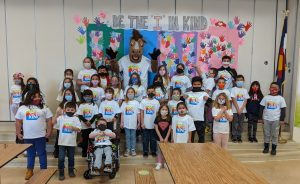Books That Look Like Me: Using Literature to Foster Students’ Self-Worth
At Malley Drive Elementary School in Northglenn, Colorado, most students are non-white. And until 2019, the characters in their library books were mostly white.
Racial equity is extremely important to Klaudia Neufeld, the SEL Specialist at Malley Drive, because when kids have representation, they are more likely to thrive. With support from the school administration, Klaudia developed a literature program to ensure that students are learning from books that reflect their identities, cultures, and families. The literature program is one segment of an overarching restorative practices program to address behavior in a way that doesn’t result in lost instruction time.
 When the school receives new books, Klaudia designs lessons—one for K-2nd grade and one for 3rd-5th grade—that involve reading the book, answering questions about it, and then doing a class activity that synthesizes what they’ve learned. For example, after a lesson that focused on kindness, students made a large “Be Kind” poster for the cafeteria where kids stand in for the letter “i”.
When the school receives new books, Klaudia designs lessons—one for K-2nd grade and one for 3rd-5th grade—that involve reading the book, answering questions about it, and then doing a class activity that synthesizes what they’ve learned. For example, after a lesson that focused on kindness, students made a large “Be Kind” poster for the cafeteria where kids stand in for the letter “i”.
Klaudia often selects books that mirror what’s going on in society to make the program intentionally current. Students are reading The Name Jar by Yangsook Choi due to the recent uptick in violence against Asian Americans. After reading The Proudest Blue, a story about a Muslim family and wearing hijabs, a kindergarten student went home and told her mother that they read a book that was like her own experience. The mother reached out to Klaudia to say that in all her years of being a parent to four kids in the school district, that was the first time it really felt like someone had seen her kids.
“Our school mantra is, ‘I am good; I deserve good things,’” notes Klaudia. “The power of this program is that reminds everyone that these kids have all these assets that they bring. Society often looks at racial and ethnic minorities like they are less than, and this program is a counternarrative that flips it and says these kids have grit and resilience and other great qualities that they bring. It helps them shine.”
To bring these lessons home, everything is translated into students’ own language and always include at-home activities with instructions for how to do things with their family. In addition to the literature lessons, Klaudia runs open-invitation small group sessions over Zoom during virtual learning. Oftentimes, students’ whole families will sit down for these sessions and participate in the conversation and activities.
Since implementing these SEL initiatives, discipline issues have become nearly nonexistent. Klaudia attributes this to the fact that kids feel more valued which has made them happier. If students bring up an issue in the classroom, staff is trained to dispatch an adult who can support them. And the program has had far-reaching benefits: Two other schools in the district have adopted the same model.
Says Klaudia, “It’s important for all kids to be seen and heard and valued in their learning environments. They should be able to see themselves and their experiences in their literature and in their lessons.”
Categories: Elementary School, People Taking Action, Social Emotional Health, Colorado